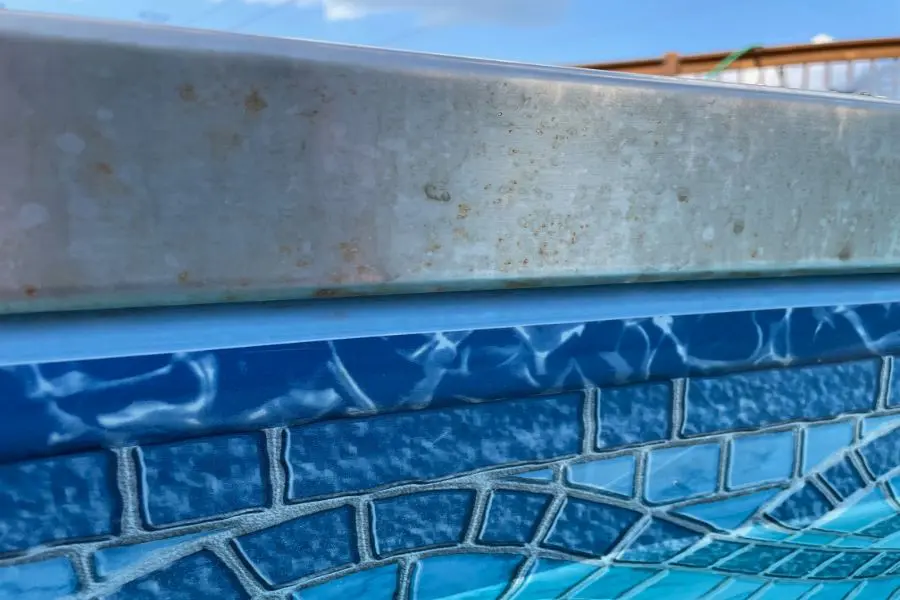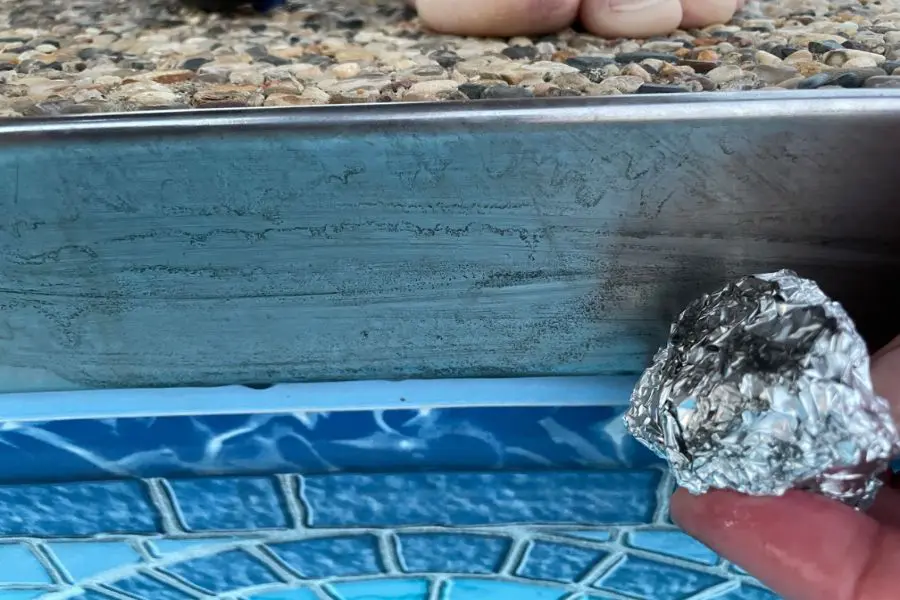Pool coping is the ledge that goes around your pool in order to protect its edge and provide a decorative transition. Coping is available in many different materials, including stone, vinyl, and various metals.
It’s exposed to sun, water, cold, heat, and chlorine, and therefore needs regular cleaning.
One of the downfalls with metal coping is that they are subject to corrosion and staining. Pools with aluminum or stainless steel coping may end up with mineral build up or even a light appearance of rusting.
In this post we’ll review how to clean aluminum pool coping along with some simple ways to extends its lifespan. Fortunately, it’s a relatively easy process if you’re willing to apply a bit of manual labor.
Let’s dive in!
How to Clean Aluminum Pool Coping?
Pool coping usually gets stained from frequent exposure to chemicals in the pool along with general outdoor conditions, including precipitation, debris and bugs. That’s why it requires regular cleaning.
Cleaning Calcium Deposits
Pool coping prevents water damage, but pool water often leaves calcium deposits on its surface. These calcium deposits often result in a white chalky formation on the aluminum coping.
Ideal calcium hardness (CH) ranges from 200 to 400 ppm. High CH may or imbalanced pH can increase the presence of the deposits.
While cleaning the coping, you should ensure the water level is lower than the coping itself especially if using cleaning products. Additionally, always read the directions on any product before using it.
Here are a couple of easy ways that help get rid of calcium deposits on the aluminum pool coping:
Lemon Juice or Vinegar
Acid helps dissolve calcium build up from surfaces. Common household items such as lemon juice or vinegar are acidic and can be used to battle the calcium residue.
Simply cut a lemon in half and rub it over the mineral deposit. Allow the juice to remain on the surface for several minutes before lightly scrubbing the coping with a sponge or cloth.
Alternatively, mix equal parts vinegar and water into a spray bottle. Spray the vinegar mixture onto the coping and allow it to sit for several minutes before wiping away the residue.
Splash some water onto the coping afterwards to remove any of the remaining lemon juice or vinegar.
Abrasives
Using an abrasive material is a physical way to remove calcium build up from bare aluminum coping. Abrasives can come in a coarse grit or fine grit.
Before using an abrasive, it’s important to know that they will likely scratch the surface of the aluminum. While the scratches will be nearly invisible for bare aluminum, the abrasives could cause chipping on painted aluminum.
For thick calcium deposits, a coarse grit abrasive may be most effective. This includes 600 grit sandpaper or a green Scotch brite pad.
For light calcium deposits, a fine grit abrasive may suffice. This includes powdered products such as Bar Keepers friend. A slurry of water and powdered cleaner can be formed and then wiped onto the surface of the coping.
Gentle circular motions should be used when using an abrasive to clean the coping as this will provide a more uniform polished appearance.
Power Washing Aluminum Pool Coping
A power washer is a great tool for cleaning just about any surface, including aluminum pool coping. The power washer provides a pressurized stream of water that you can aim at the stains you want to be cleaned.
Fortunately, you don’t need any cleaning solution to go with the power washer, as the pressure alone is often enough to give your pool coping a sparkling appearance.
When using the pressure washer, it’s always best to start with the lowest pressure setting and then increase it gradually if needed. Using a wide nozzle to start will also help prevent accidental damage to the coping.
When spraying the coping, move the wand in a sweeping motion to avoid too much pressure hitting a single spot.
How to Remove Rust from Metal Coping

Since metal coping is frequently exposed to pool chemicals and the weather elements, it may eventually develop brownish rust spots. Sometimes it may be just a faint brown tarnish, while severe instances of rust may result in some flaking.
The rust spots occur when bits of iron in the metal oxidize –this can occur on either aluminum or stainless steel coping.
An acid, such as vinegar, may be used to clean the rust from the coping as previously described.
However, if you have bare (unpainted) metal coping with stubborn rust, using tin foil is a great option. Here’s how to use tin foil to remove rust:
1 – Crumple tin foil into a ball.
2 – Dip the tin foil into either vinegar or water. Vinegar is best for heavy rust.
3 – Rub the wetted tin foil onto the rust stains in a circular motion until the rust disappears.
4 – Continue to re-wet the tin foil during use.
How to Extend Pool Coping’s Lifespan
Aluminum pool coping is in frequent contact with pool water, weather elements, UV rays, and physical scuffs. Here are some tips to keep it looking fresh:
Regular Cleaning
Periodically clean the pool coping to remove dirt and debris. Gently scrubbing with a soft-bristle brush, such as the pool brush, will help dislodge contaminants that could cause eventual staining or scratching.
Avoid Abrasive Materials
When cleaning or maintaining your pool, avoid using abrasive materials or tools that can scratch or damage the aluminum coping. There are instances when abrasives may be appropriate, such as heavy mineral build up or prepping for repaint.
Otherwise, for routine cleaning use soft brushes, sponges, or cloths.
Water Chemistry
It’s important to ensure the pool water is properly balanced, not just for swimmers but also for the pool components. pH and alkalinity that is outside normal range can result in corrosion of metal coping.
Regularly test and adjust the pool water chemistry as part of your pool upkeep. Even if the pool water looks clear, it’s important to use a test kit to verify the balance.
Timely Repairs
Regularly inspect your aluminum pool coping for any signs of damage, including dents, scratches, or corrosion.
It’s key to promptly address issues, such as peeling paint or deep scratches, to prevent further damage or deterioration. For minor scratches or blemishes, you can use touch-up paint specifically formulated for metallic pool/marine surfaces.
Winterization
If you live in an area with freezing temperatures, properly winterize your pool and aluminum coping. Drain the pool such that water is not in contact with the coping.
A winter pool cover may also help to protect the coping from the harsh winter elements.
How to Paint Aluminum Pool Coping
Painting or touching up your aluminum pool coping will give it a new clean look for the next swim season.
Choose a pool-safe or marine-grade paint that’s intended for metal surfaces. This will help ensure it will withstand the pool chemicals. Often the paint can be formulated to match a color of your choosing.
Before starting the project, it’s important to ensure dry weather for at least several days. Review the paint dry times to determine just how many days of dry weather is needed. You’ll also need to avoid using the pool while the paint is drying.
After cleaning your aluminum pool coping, follow these steps for painting it:
1) Scrape away any loose or flaking paint.
2) Sand the aluminum coping with fine-grit sanding paper for a smooth surface. If you’re not picky, you can focus the sanding on any chipped or worn areas rather than sanding the entirety down to bare metal.
3) Use painter’s tape around the coping to protect the pool’s liner as well as the pool’s deck.
4) Apply two coats of marine grade primer using a brush. Allow adequate dry time between coats per the manufacturer’s instructions.
5) Paint the aluminum coping with the top-coat. Allow adequate dry time before exposing it to water.
Final Takeaway
Coping is essential for protecting the transition from the pool to the surrounding decking. And keeping it clean is important in extending its lifespan.
Fortunately, it’s a relatively simple process to clean aluminum pool coping. Like most projects, using the right supplies is key to success.
The cleaning process may vary depending on if you’re dealing with mineral build up or rust stains, and whether the coping is bare metal or painted metal.
Eventually, you may find that the aluminum coping requires a paint job in order to provide it with new life.
Happy Swimming!
Husband and father of three (actually, four if you include the pool). I’m an avid DIY-er and weekend warrior that enjoys taking up new projects around the house to help us maximize leisure right at home. I enjoy researching and sharing various tips, tricks and knowledge to help others make their home an oasis.

